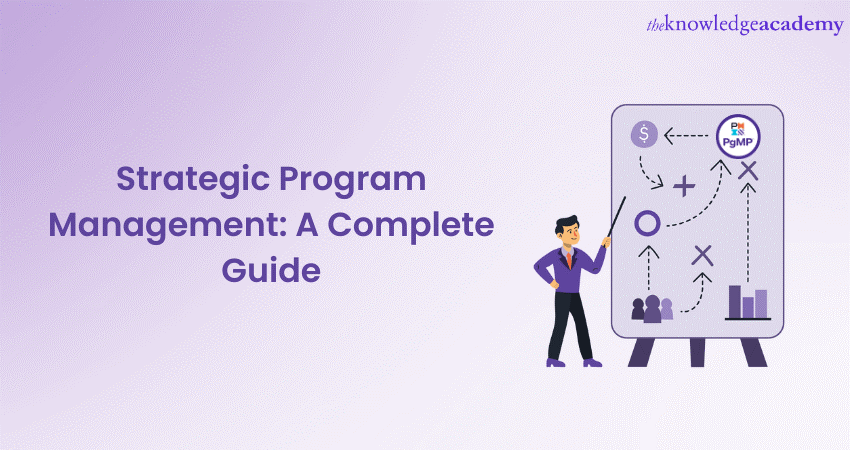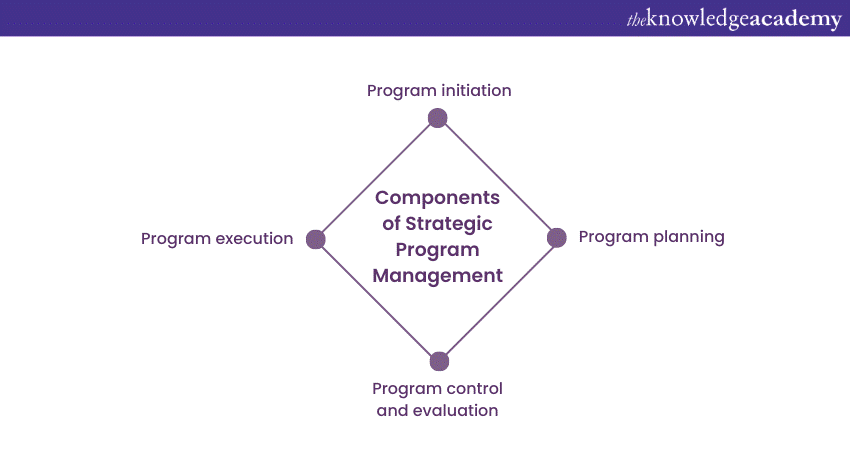We may not have the course you’re looking for. If you enquire or give us a call on + 1-866 272 8822 and speak to our training experts, we may still be able to help with your training requirements.
Training Outcomes Within Your Budget!
We ensure quality, budget-alignment, and timely delivery by our expert instructors.

Strategic Management is a comprehensive approach to planning, executing, and controlling programs that align with an organisation's strategic objectives. It provides a framework for managing multiple related projects in a coordinated manner, ensuring that resources are effectively allocated, and goals are achieved. In this blog, we will delve into the fundamental concepts of Strategic Program Management and how you can plan your programs strategically.
Table of Contents
1) Understanding Strategic Program Management
2) Key components of Strategic Program Management
3) Implementing a Strategic Program Management strategy
4) Benefits of Strategic Program Management
5) Conclusion
Understanding Strategic Program Management
Strategic Program Management involves coordinating multiple projects, referred to as a program, to achieve specific strategic goals. Unlike individual projects, programs are characterised by interdependencies, shared resources, and collective impact. A program is a collection of related projects that, when combined, contribute to achieving a broader objective that aligns with the organisation's strategy.
To distinguish between projects and programs, it's essential to recognise that projects focus on delivering specific outputs within predefined constraints, such as time, budget, and scope. On the other hand, programs encompass multiple projects and provide strategic direction, integrating and aligning these projects to realise desired outcomes and benefits.
Strategic alignment is a critical aspect of Program Management. Programs should be aligned with the organisation's overall strategy and objectives, ensuring that the efforts invested in the program contribute to the organisation's success. Organisations can optimise their resources, increase efficiency, and achieve long-term strategic goals by adopting this approach.
Key components of Strategic Program Management

Organisations can effectively manage their programs by focusing on these key components, ensuring alignment with strategic objectives, optimising resource utilisation, and achieving desired outcomes.
Program initiation
Program initiation is the first step in Strategic Program Management. It involves defining the program objectives, identifying the strategic fit, and understanding the key stakeholders. During this phase, it is essential to assess the feasibility and alignment of the program with the organisation's strategic priorities. By clearly defining the program's objectives, the organisation can ensure that all efforts are directed towards achieving the desired outcomes.
Program planning
Once the program is started, a comprehensive plan is developed to guide its execution. This involves creating a program roadmap that outlines the program's major milestones, deliverables, and dependencies.
Additionally, establishing a program governance structure ensures effective decision-making and accountability throughout the program's lifecycle. The program charter is also defined, providing a clear mandate, scope, and objectives.
Elevate your Project Management career with the PMP® Certification Training Course! Join now to gain the essential skills, knowledge, and strategies needed to excel in the PMP® exam and become a certified Project Management Professional.
Program execution
During the program execution phase, the focus shifts to managing program resources, monitoring progress, and addressing risks and issues. Resource management involves allocating the necessary personnel, budget, and equipment to individual projects within the program.
Regular monitoring of program progress helps identify any deviations from the plan, allowing for timely corrective actions. Addressing risks and issues ensures that potential obstacles are mitigated, minimising the impact on program outcomes.
Program control and evaluation
Program control and evaluation are ongoing processes that ensure the program remains on track and delivers the intended results. Tracking program performance through key performance indicators (KPIs) and metrics provides valuable insights into the program's progress and allows for data-driven decision-making.
Regular program reviews are conducted to assess achievements, identify areas for improvement, and adapt the program strategy as needed. Flexibility and agility are essential in responding to changing circumstances, ensuring the program remains aligned with the organisation's strategic goals.
Get the skills and knowledge you need to succeed as a project manager with our PMI Project Management Ready training.
Implementing a Strategic Program Management strategy
By implementing these Strategic Management practices, organisations can establish a solid foundation for successful program execution, enabling effective governance, standardised processes, and enhanced collaboration across programs.
Defining a Program Management Office (PMO)
Establishing a Program Management Office (PMO) is a central authority for Program Management within the organisation. The PMO provides guidance, standardisation, and support for program managers, ensuring consistency and best practices across programs.
Establishing program management methodologies and frameworks
Developing and implementing Program Management methodologies and frameworks provide a structured approach to program execution. These frameworks outline standardised processes, tools, and templates that facilitate effective program planning, execution, and control.
Ensuring effective communication and collaboration
Successful Strategic Management implementation requires open and Effective Communication channels. It includes fostering collaboration among stakeholders, Program Managers, and project teams, enabling seamless information sharing and decision-making throughout the program lifecycle.
Take your Program Management skills to the next level with our Program Management Professional (PgMP)® training.
Benefits of Strategic Program Management
Here are the key benefits of Strategic Program Management
a) Enhanced alignment with organisational strategy: It ensures programs are directly aligned with long-term objectives, maximising their impact on the organisation's success.
b) Improved resource utilisation and efficiency: Programs optimise resources by coordinating and streamlining processes, resulting in higher efficiency and cost reduction.
c) Greater visibility and control over interrelated projects: A strategic approach provides better visibility into project interdependencies, enabling informed decision-making and proactive Risk Management.
d) Increased ability to manage program risks and adapt to changes: It identifies and addresses risks, allowing for timely mitigation and adaptation to changes in the external environment.
Advance your career in Portfolio Management with our Portfolio Management Professional PfMP® training! Join now to master the principles, practices, and techniques required to excel as a Portfolio Management Professional.
Conclusion
Strategic Program Management is a vital discipline that enables organisations to achieve their long-term objectives by effectively managing interrelated projects. By understanding the key components, roles, and benefits, organisations can develop a roadmap to successfully plan and execute programs aligned with their strategy, maximising their impact and driving overall organisational success.
Learn the essentials of Project Management with our extensive range of PMP® Training courses.
Frequently Asked Questions
Upcoming Project Management Resources Batches & Dates
Date
 PMP® Certification Training Course
PMP® Certification Training Course







 Top Rated Course
Top Rated Course



 If you wish to make any changes to your course, please
If you wish to make any changes to your course, please


